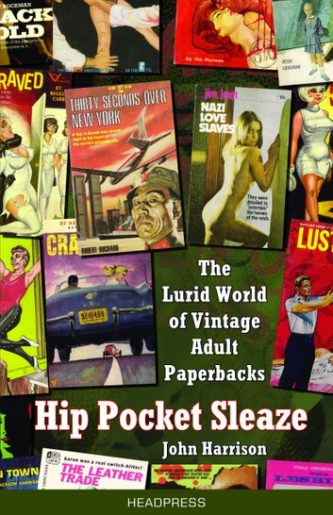 By JOHN HARRISON (Headpress; 2011)
By JOHN HARRISON (Headpress; 2011)
The vintage adult paperback community is a small one to be sure, but for those of us who are into such things John Harrison’s HIP POCKET SLEAZE is an essential acquisition. In fact, it may turn out to be the bible for sleazy book connoisseurs. The world of vintage pulp novels has been written about elsewhere, but mostly in discussion of the likes of Philip K. Dick, Jim Thompson and Charles Willeford, great writers who did time in the pulp trenches. HIP POCKET SLEAZE focuses on the other, lesser-known authors and books that defined the pulp sphere.
Author John Harrison clearly knows his subject matter inside and out, providing a brief yet informative history of paperbacks as well as a plethora of reviews and checklists of all sorts of sleazy publications covering most every genre—including, needless to say, horror, with coverage on James Herbert’s RATS novels, Charles Manson cash-ins, witchcraft exposes, etc. Harrison’s love for such fare is evident in his prose, which has a zeal and enthusiasm redolent of a true obsessive.
Also covered herein are biker, JD, Nazi-sploitation and movie novelization paperbacks. There are revealing interviews with the likes of lesbian pulp pioneer Ann Bannon, sci fi-porn specialist Richard E. Geis, trash fiction maestro Jim Harmon and even H.G. Lewis, in what as far as I know is the only interview devoted entirely to Lewis’ unforgettable novelizations of his self directed films BLOOD FEAST and TWO THOUSAND MANIACS. Alternate views are provided by the inclusion of a letter from the novelist Lawrence Block saying he’s not interested in revisiting his early pulp days and an email from Robert Tralins objecting to the word “Sleaze” in this book’s title. Rounding things out are chats with the paperback collectors Chris Eckhoff and Mariam Linna, whose tales of rare book finds had me seething with jealousy.
Harrison admittedly goes a bit off topic in the final chapters, devoted to non-book related subjects like 8mm porn loops and Adam Film World magazine. I’ll forgive such indulgences, however, as the book overall is so impressive, illuminating as it does the grubbiest corners of the publishing world with considerable panache.
